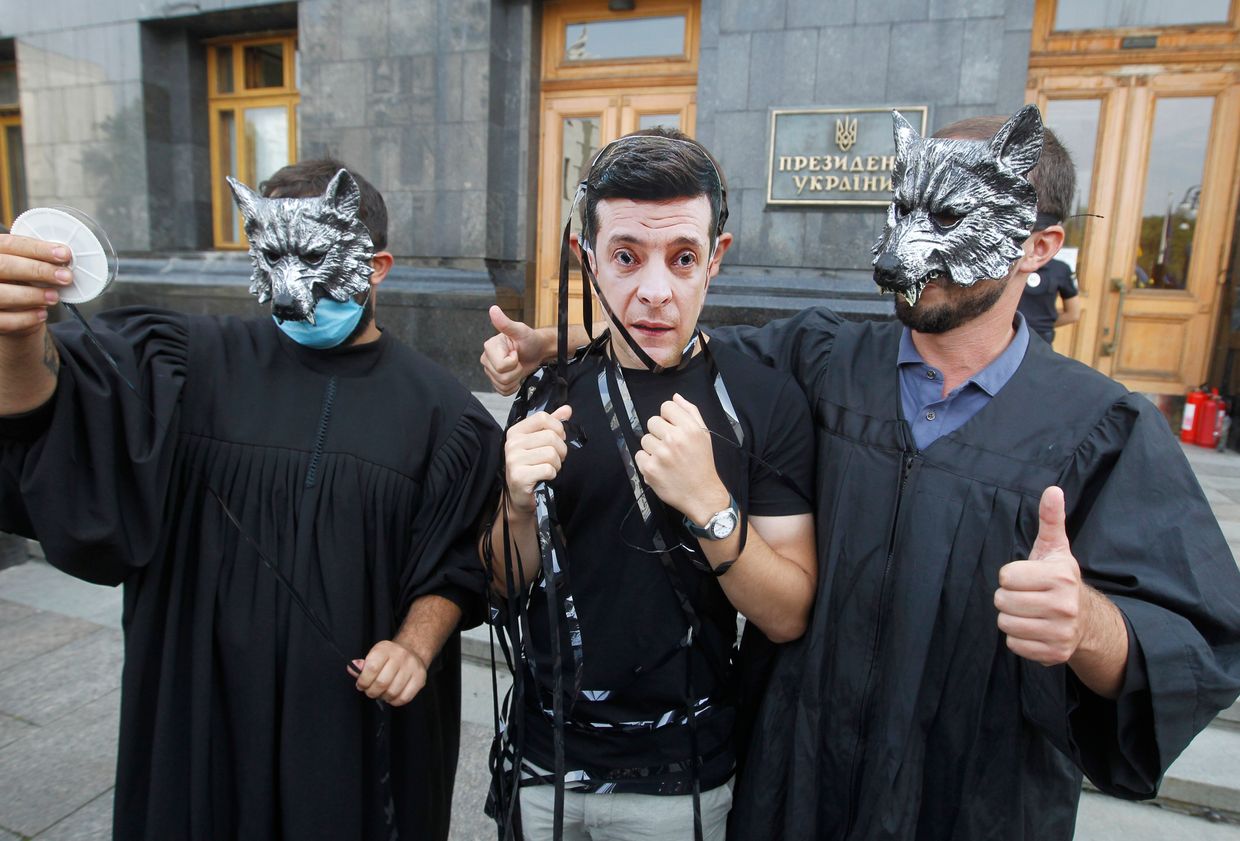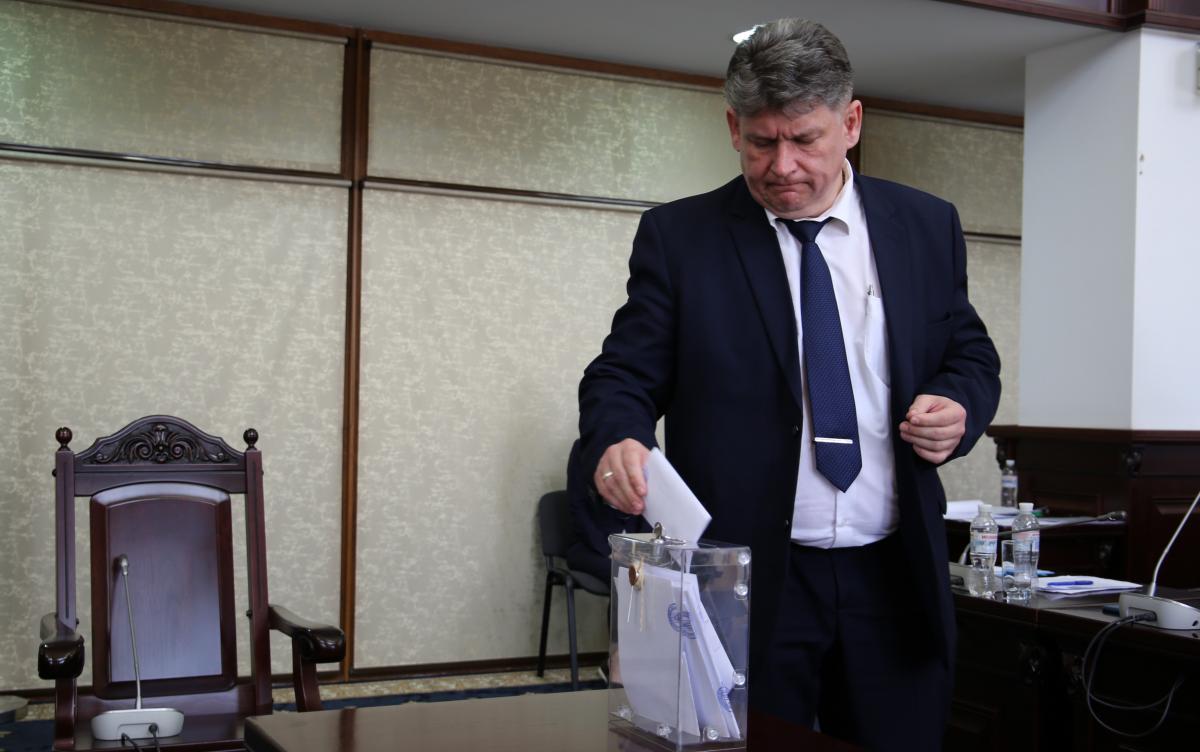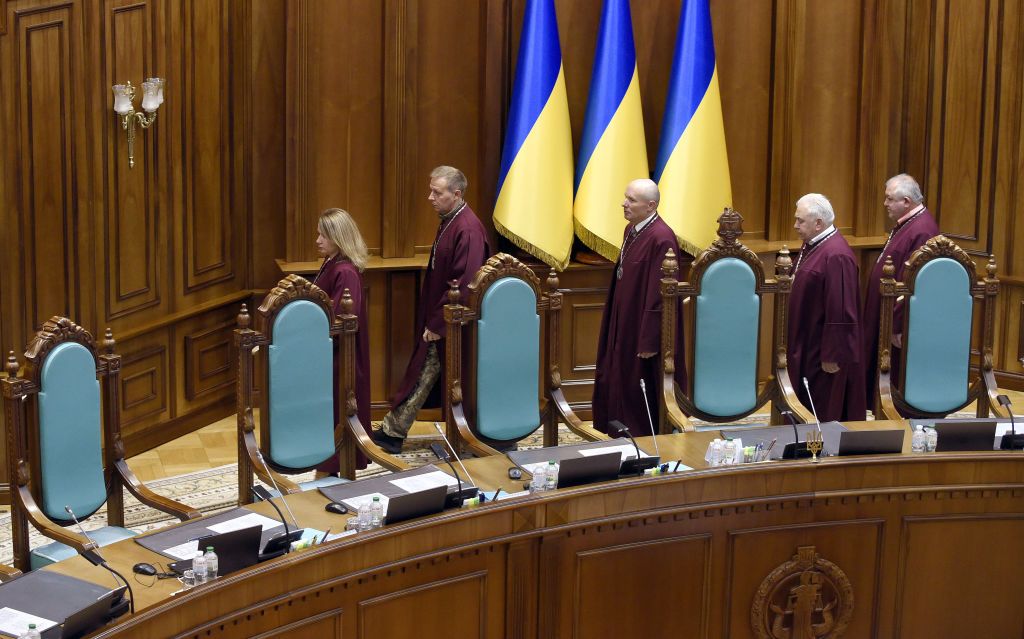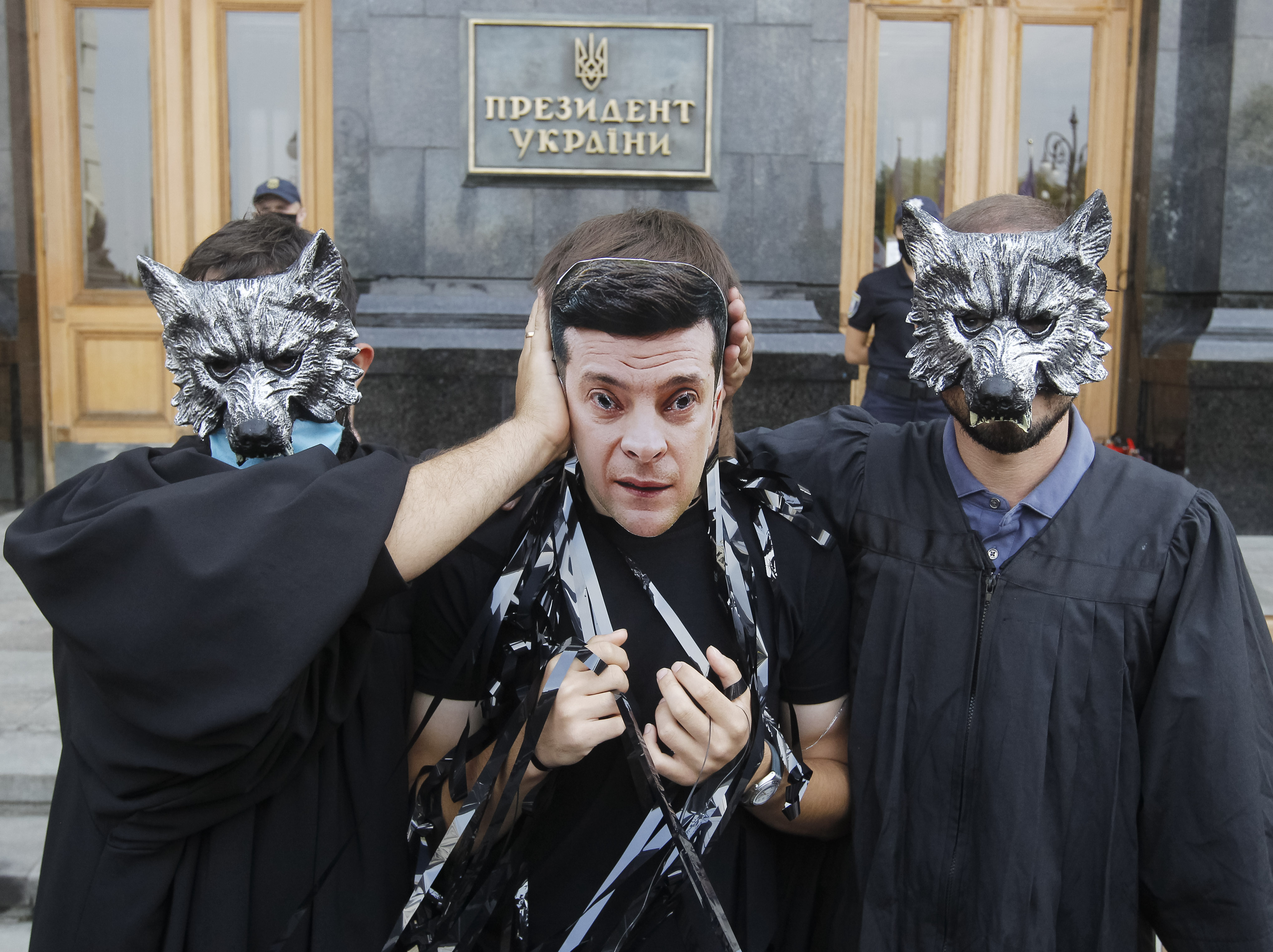Judicial reform in limbo as only few tainted judges are fired or convicted

On the tenth anniversary of the pro-Western EuroMaidan Revolution, the Ukrainian parliament approved the first reading of a bill that effectively destroys one of the key tools of the ongoing judicial reform, the Public Integrity Council.
The council is an independent civil society watchdog that assesses the integrity of judges and plays a key role in the reform.
The bill seeks to subordinate the watchdog to the High Qualification Commission, a judicial governing body, and make it effectively impossible for the council to assess judges’ integrity.
The move to destroy the Public Integrity Council highlights the state in which judicial reform is 10 years after the start of the EuroMaidan Revolution, commemorated on Nov. 21.
Although formally several judicial reforms have been carried out, the changes appear to be mostly cosmetic. Few tainted judges have been fired and even fewer have been jailed.
Ukraine’s most notorious judge, Pavlo Vovk, remains a judge on the payroll, even though his tainted court has been dissolved by the authorities. A corruption case against him is being considered by a court but the trial has been delayed and sabotaged, and its prospects are uncertain.
Another judge, ex-Supreme Court head Vsevolod Kniaziev, has also been charged with corruption. However, critics say his case is collapsing as several of his alleged accomplices still face no charges, and his bail has been cut several times.
Judges of the Supreme Court have been accused of entrenching corruption by appointing a tainted judge as Kniaziev’s replacement.
A third judge, ex-Constitutional Court Head Oleksandr Tupytskyi, fled abroad in 2022 after being charged.
The Constitutional Court’s fate hangs in the balance as several discredited members have been appointed to a panel that will vet candidates for future Constitutional Court jobs.
Ukraine’s biggest judicial graft case
A key litmus test for judicial reform is the fate of Vovk, former head of the now defunct Kyiv District Administrative Court.
He has become a symbol of injustice, lawlessness, and impunity in Ukraine. In 2019-2020 he and other judges of his court were charged with usurpation of power, obstruction of justice, organized crime, and abuse of authority.
In audio recordings published by the National Anti-Corruption Bureau of Ukraine (NABU) in 2019-2021, Vovk is heard discussing numerous corrupt deals and giving illegal orders.
The case against Vovk and other judges of his court was sent to the High Anti-Corruption Court in June 2022.
Vadym Valko, a lawyer at the Anti-Corruption Action Center, told the Kyiv Independent that the defendants’ lawyers had delayed the case for many months.
First, the court was unable to select judges to handle the case for months because of multiple recusals filed by lawyers. Even after the judges were selected, the case was stalled because Vovk and several other defendants initially refused to attend court hearings.
The court is currently considering a motion to close the case because the lawyers claim the deadline for submitting it to trial was missed.
One of the reasons for the delays is that Vovk still enjoys judicial immunity, and it is impossible to suspend, fire or arrest him without the approval of the High Council of Justice, the judiciary’s main governing body.
The case could have been moved forward if the High Council of Justice had authorized Vovk’s arrest or fired him, according to Valko and Mykhailo Zhernakov, head of judicial watchdog Dejure.
However, both the council and other government bodies have done their best to protect Vovk.
In 2020, the previous High Council of Justice unanimously refused to suspend Vovk and other judges implicated in his case. Since then, all members of the council have been replaced.
Several members of the council who made the decision on Vovk in 2020 were implicated in the Vovk case. In wiretapped conversations released by the NABU, Vovk mentioned their alleged involvement in his alleged corrupt schemes.
Former Prosecutor General Iryna Venediktova, now ambassador to Switzerland, refused to authorize an arrest warrant for Vovk and to let the NABU search Vovk’s office or wiretap him.
In December 2022, the U.S. sanctioned Vovk “for soliciting bribes in return for interfering in judicial and other public processes.”
The same month, Zelensky signed a bill to liquidate Vovk’s Kyiv District Administrative Court.
Despite the liquidation of the court, Vovk still remains a judge. He keeps receiving a salary financed by Ukrainian taxpayers and has a legal right to be transferred to another court.
Firing corrupt judges
It has been impossible to fire Vovk and other tainted judges due to legislative hurdles for a long time.
In 2021, the High Council of Justice was stripped of its right to fire judges through disciplinary cases due to a law that created special disciplinary inspectors for this purpose.
Disciplinary inspectors have not been appointed since then.
Vitaly Tytych, an ex-head of the Public Integrity Council, believes that the delay with disciplinary cases was intentional and was part of the sabotage of judicial reform by the authorities.
“The disciplinary inspectors were a tool for delaying the reform. That’s how they deceived our Western partners,” he told the Kyiv Independent.
In February 2022, the High Council of Justice stopped working altogether when most of its members resigned. It resumed working only in January 2023 after the appointment of new members.
In September, parliament passed a bill allowing the council to consider disciplinary cases and fire judges before disciplinary inspectors are appointed. On Nov. 1, the High Council of Justice resumed considering disciplinary cases against judges, and now Vovk’s dismissal is theoretically possible.
But Valko said that it could be possible to fire Vovk through a disciplinary procedure only if there are new disciplinary cases against him. The deadlines for old disciplinary cases have likely expired, he added.
Another procedure that could lead to Vovk’s dismissal is qualification assessment, or vetting. It is carried out by another top judicial body, the High Qualification Commission.
In 2019, 34 judges of Vovk’s Kyiv District Administrative Court did not show up for vetting at the commission, claiming that they were sick. The Vovk tapes document the judge’s efforts to illegally sabotage and block vetting.
The vetting of judges was suspended in 2019, when the previous High Qualification Commission was dissolved. A new commission was only appointed this June.
On Nov. 13, the High Qualification Commission resumed the vetting of judges.
However, there are doubts about the commission’s intention to cleanse the judiciary.
Earlier in November the High Qualification Commission overrode the Public Integrity Council’s vetoes on two judges who the council says do not meet ethics and integrity standards.
One of them, Roman Koval, has arbitrarily banned video recording at a court hearing and failed to declare some of his assets, while his relatives regularly visited Russia in 2014-2018, according to the Public Integrity Council.
The other judge, Ivan Solovyov, has issued court rulings without being present at his court, which is illegal, made rulings in Russian in violation of the language law and failed to declare some of his assets, the Public Integrity Council said.
Koval and Solovyov denied the accusations of wrongdoing.
Corruption at Supreme Court
Another high-profile case, that against former Supreme Court chairman Kniaziev, is also facing obstacles.
In May, the NABU charged Kniaziev with taking a $2.7 million bribe.
The bail in the Kniaziev case has been reduced several times – from $3 million to $1 million.
The NABU said in May that several other Supreme Court judges had also taken bribes.
The judges include Iryna Hryhoryeva, Serhiy Storozhenko, and Zhanna Yelenina, according to the Anti-Corruption Action Center. They did not respond to requests for comment.
The numbers and series of the banknotes owned by these judges coincided with those received by Kniaziev as a bribe, Zhernakov and Valko said.

However, eventually the judges have not been charged, prompting speculation that law enforcement agencies are covering up for them.
Valko and Zhernakov said that the NABU allegedly did not have enough evidence to charge the judges.
“But if there is evidence (against the judges) and it has been hidden, then it’s a big problem,” Valko said.
The judges could claim that they got the money as part of a foreign exchange deal with Kniaziev, although it sounds improbable and absurd, according to Zhernakov.
Kniaziev’s replacement as chairman of the Supreme Court, Stanislav Kravchenko, is also controversial.
According to the Public Integrity Council, he has violated ethics and integrity standards.
Kravchenko has failed to declare some of his assets and violated human rights in one of his cases, according to a 2015 decision by the European Court of Human Rights, the council said.
“The Supreme Court judges’ response (to the Kniaziev scandal) was to choose a corrupt official as chairman,” Zhernakov said. “Corruption is not a problem for them. The problem is to make sure that you don’t get caught, like Kniaziev.”
Kravchenko denied the accusations of wrongdoing in a comment for the Kyiv Independent.
Scandals at the Constitutional Court
The third high profile judge under investigation, ex-Constitutional Court Chairman Tupytskyi, was charged in 2021 with bribing a witness and obstruction of justice. He was also sanctioned by the U.S. that year.
He fled Ukraine after the beginning of Russia’s full-scale invasion, Radio Free Europe/Radio Liberty reported in 2022.
The situation with Tupytsky epitomizes long-running controversies surrounding the Constitutional Court, which has been involved in many corruption scandals and obstructed key reforms.
Under pressure from civic activists and the West, the Ukrainian authorities passed a law on Constitutional Court reform in August.

According to the law, three representatives of the Ukrainian government and three experts nominated by international organizations will vet candidates for Constitutional Court jobs.
Additionally, there are six deputies who will replace them if they quit.
If the votes are split evenly (three to three), a second vote must take place, and the votes of the international experts prevail.
On Nov. 13, the vetting panel held its first meeting. However, there are great concerns about it.
The Council of Judges, a judicial self-regulation body, delegated to the vetting panel Yaroslav Romaniuk, who was the head of the Supreme Court under pro-Russian President Viktor Yanukovych.
Romaniuk supported Yanukovych’s crackdown on EuroMaidan protesters in 2014 and has criticized Western-style judicial reforms.
Romaniuk has also issued an arbitrary ruling that constitutes “denial of justice,” according to a 2015 decision by the European Court of Human Rights.
He does not comply with ethics and integrity standards, and his daughter’s income does not match her assets, according to the Public Integrity Council.
The Public Integrity Council, as mentioned above, might soon lose its independence.
Another judge delegated by the Council of Judges to the vetting panel is Volodymyr Kuzmenko, who is implicated in the Vovk case. In the tapes from the Kyiv District Administrative Court, Vovk called him “our guy.”
Meanwhile, experts delegated to the vetting panel by the parliament include Natalia Kuznetsova and Vasyl Shakun. They are members of an NGO created by controversial Yanukovych allies Serhiy Kivalov and Andriy Portnov.
The members of the vetting panel did not respond to requests for comment.
Zhernakov said that the Ukrainian members of the vetting panel were tainted and would try to make sure the Constitutional Court is completely controlled by the Zelensky administration. Zelensky's spokesman Serhiy Nikiforov did not respond to a request for comment.
Zhernakov also said that everything depends on the foreign members of the panel.
“I hope the international experts will cooperate with Ukraine’s civil society,” he said. “This is a key thing - it’s necessary for them to know the local context.”
However, in the past international experts have often approved tainted candidates for top judicial bodies and rejected the candidacies of anti-corruption crusaders and whistleblowers.
Another problem is posed by candidates for Constitutional Court jobs.
Constitutional Court candidates nominated by the Council of Judges include several candidates who do not meet integrity and ethics standards, according to Dejure.
The list of Constitutional Court candidates approved by the parliament includes two lawmakers from Zelensky’s Servant of the People party – Oleksandr Kopylenko and Pavlo Pavlish. This violates the constitutional requirement on Constitutional Court judges’ political independence, Dejure said.
Kopylenko and Pavlish did not respond to requests for comment.
“The government wants to take over the Constitutional Court,” Zhernakov said.














